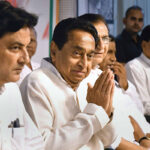- Cover Story
- Governance
- Globe Scan
- Corruption
- State Scan
- Talk Time
- Cover Story
- Governance
- Globe Scan
- Corruption
- State Scan
- Talk Time
Recent Posts
© Copyright 2007 - 2023 Gfiles India. All rights reserved powered by Creative Web INC. Anil Tyagi - Editor GfilesWritten by Anil Tyagi
Anil Tyagi - Editor GfilesWritten by Anil TyagiDECADES ago, when I was sitting with Harmohan Dhawan, the then minister of Civil Aviation in the Chandra Shekhar Government, I was told that the latter had asked the relevant ministers to give 5,000 telephone connections and 5,000 LPG connections to win the Lok Sabha election from Chandigarh constituency. I suggested to him, “You cannot win a Parliament election with only largesse. What you really need is a political narrative that can appeal to and woo the masses.” He ignored me; he also lost the election. A leader needs a compelling electoral narrative to enhance his support, especially with the growing population of fence-sitters and first-time voters. Similarly, decades ago, Narasimha Rao, the former Prime Minister of India, was asked by his party colleagues on what could be done to stop the rising popularity of the Bharatiya Janata Party (BJP) after it embraced the Ram Mandir strategy to win the elections.
Rao’s answer was simple, but insightful. “Who can fight Lord Rama?” he asked. In other words, who can fight the politics of religion, which is the opium of the masses? That narrative became quite powerful, actually powerful enough to help the BJP to form the government at the Centre in less than 10 years, not once but three times in a row.
As we approach Elections 2019, Prime Minister Narendra Modi is armed with two narratives – Ram Mandir and Nationalism. The Supreme Court decided to form a three-member Mediation Committee to find a solution to the Ram Mandir issue through discussions with the stakeholders. This will logically make it an election campaign issue. After the Pulwama attack, which killed 44 CRPF soldiers, air strikes by both India and Pakistan, and a face-off on the Line of Control, the nationalism ante is up. Politicians, and especially the BJP, will use this to woo the voters over the next few weeks. While the twin-narrative of Mandir and Desh Khatrey Mein may work in the BJP’s favour this time, it is unlikely to prove beneficial in the long term, or even in the general elections in 2024. The reason is, this government as well as past ones, have willingly or by default abdicated the agenda of governance. For example, despite the schemes and rhetoric, the number of unemployed people has gone up in the past decade. The use of technology in capital intensive sectors has only shrunk employment.
More importantly, the strength of the governance workforce, i.e. the number of civil servants in central and state governments, has reduced. At the moment, 1.75 per cent of the population is engaged in the country’s administration. In developed countries and matured democracies, the percentage is generally between four and six per cent. A combination of lower number of civil servants, and myopic schemes has increased the distress levels of the masses, who are hit by inflation, unemployment, non-remunerative farming, lack of development, and living without hope, and uncertain future. As the election narrative unfolds, people will decide the future of the next government in the coming weeks. This ritual will be repeated in 2024 once again.
Decades back, during the 1977 elections, the politicians did not script the narrative. Instead, they and the political parties were compelled to campaign on the basis of the demands of the people. People-driven election narratives across the globe result in meaningful democracies. Politician-driven ones tend to vanish early and get consigned to the dustbins of history.
World over, democracies have voted for “We can Change”, “America First”, “Brexit or Not” and our own “Garibi Hatao” and “India Shining”. Now it is “Na Mumkin ab Mumkim Hai”. The stronger the politician, the louder are the slogans, which weakens democracy. Democracy thrives when people decide the narrative and politicians follow. A reversal is detrimental to democracy. India waits for the day when people, and not politicians, will decide the contours of election campaigns.
ANIL TYAGI
editor@gfilesindia.comRecent Posts
Related Articles
From the EditorFrom the Editor
Written by Anil Tyagi COVID-19 has devastated us socially, mentally, physically, and economically....
ByAnil TyagiMay 5, 2020From the EditorFrom the Editor
Written by Anil Tyagi COVID-19 is a virus, a physical being, howsoever miniscule,...
ByAnil TyagiMarch 4, 2020From the EditorFrom the Editor
Written by Anil Tyagi This is another face of capitalism, albeit an ugly...
ByAnil TyagiFebruary 5, 2020From the EditorFrom the Editor
Written by Anil Tyagi WHAT is governance? In modern parlance, it implies a...
ByAnil TyagiJanuary 7, 2020 - Governance
- Governance


























































